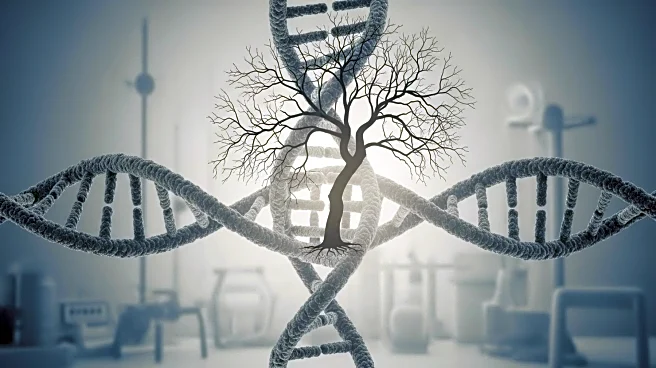What's Happening?
Researchers at the University of Illinois Urbana-Champaign have discovered surprising evolutionary connections between the genetic code and dipeptides, which are tiny protein fragments. Led by Professor Gustavo Caetano-Anollés, the study explores the origin and evolution of the genetic code, revealing that the dipeptide composition of a proteome is mysteriously linked to the genetic code. The research team analyzed 4.3 billion dipeptide sequences across 1,561 proteomes from various organisms, constructing a phylogenetic tree to trace dipeptide evolution. Their findings suggest that dipeptides played a significant role as early structural modules of proteins, contributing to the development of the genetic code. This study provides valuable insights for fields such as genetic engineering and bioinformatics.
Why It's Important?
The findings from this study have significant implications for genetic engineering, synthetic biology, and biomedical research. By uncovering the evolutionary roots of the genetic code, researchers can better understand the constraints and logic underlying genetic processes. This knowledge can guide the design of genetic modifications, enhancing the resilience and functionality of engineered biological systems. The study also highlights the importance of an evolutionary perspective in synthetic biology, which can strengthen genetic engineering by aligning it with natural processes. Understanding the antiquity and resilience of biological components is crucial for developing effective and sustainable biotechnological solutions.
What's Next?
The research opens new avenues for exploring the role of dipeptides in protein folding and function, potentially leading to advancements in synthetic biology and genetic engineering. Future studies may focus on the practical applications of these findings, such as developing novel therapeutic strategies or improving the efficiency of genetic modifications. Additionally, the insights gained from this study could inform the design of new bioinformatics tools and techniques for analyzing genetic data. Researchers may also investigate the broader implications of dipeptide evolution in other areas of biology, contributing to a deeper understanding of life's origins and the development of complex organisms.
Beyond the Headlines
The study's revelation of dipeptide duality and synchronicity in the evolutionary timeline suggests a fundamental aspect of the genetic code with transformative implications for biology. This duality indicates that dipeptides may have arisen encoded in complementary strands of nucleic acid genomes, interacting with primordial synthetase enzymes. Such findings could reshape our understanding of protein evolution and the mechanisms driving genetic diversity. The research also underscores the importance of molecular editing, catalysis, and specificity in shaping the genetic code, offering insights into the co-evolution of synthetase enzymes and tRNA.










